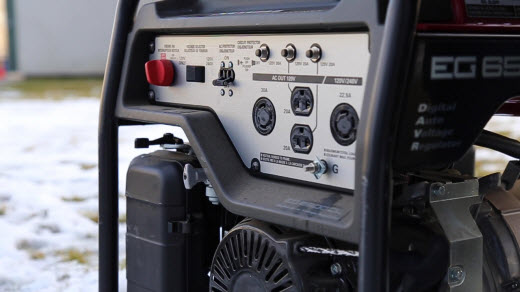https://www.redcross.ca/how-we-help/emergencies-and-disasters-in-canada/be-ready-emergency-preparedness-and-recovery/generator-safety
Using a Generator Safely at Home
Using a portable generator after a power outage is definitely handy, but generators can be dangerous if they’re used incorrectly. Be cautious and always follow all safety instructions provided by the manufacturer. The following are some safety tips and information about the dangers of home generators. You should consult a professional for assistance when installing a home generator and for advice with respect to your specific circumstances and generator type.
Setting up your generator
- Start by making sure the generator has all the necessary safety labels.
- Make sure the generator you purchase is rated for the power that you think you will need.
- Find a qualified electrician to install the generator in a safe location.
- Before using a generator make sure the unit is properly grounded and follow the instructions and electrical codes carefully.
- When in doubt always ask a professional.
Potential Hazards
The two main hazards to be aware of when using a generator are electrocution and carbon monoxide poisoning. Portable generators can also be fire hazards. Electrocution
- Losing power during a flood is not uncommon. However, never use a generator in a flooded basement. It’s important to keep the generator in a dry place.
- Make sure to protect the generator from rain and cover it with a canopy if necessary.
- Always operate the generator in a dry place and make sure your hands are dry.
Carbon Monoxide Poisoning
- Carbon monoxide poisoning happens when someone breaths in too much carbon monoxide, an odourless colourless gas that can be deadly.
- Be sure to keep the generator somewhere with proper ventilation.
- If the generator is outside, don’t place it close to any windows or vents because carbon monoxide can build up inside.
- Have working carbon monoxide detectors throughout your home and check the batteries frequently. If the detectors are wired to the house’s electricity supply, make sure they have battery-powered back-ups.
- The symptoms of carbon monoxide poisoning include dizziness, headaches, nausea and tiredness. If you experience any of these symptoms go outside for fresh air immediately.
Fire Hazard
- Generators become extremely hot during operation.
- Let the generator cool down and turn it off before refueling. Never refuel the generator while it’s still hot.
- Store your fuel outside in approved containers. Don’t store any fuel near a fuel-burning appliance or the generator itself.
Canadian Red Cross emergency preparedness information is provided for free to the public on an “as is” basis to increase preparedness and safety. Best effort is made to ensure accuracy and the absence of defects. However, Canadian Red Cross does not warrant the accuracy, completeness, timeliness, fitness for a particular purpose, or non-infringement of the information. By using the information, you agree that Canadian Red Cross is not liable for any defect in the materials, any decision or action you take based on the materials, or any associated damage or expenses (direct or indirect).

No comments:
Post a Comment